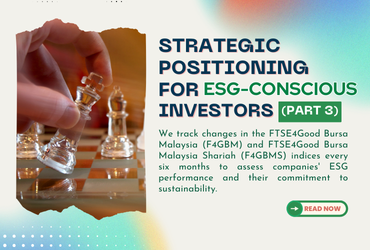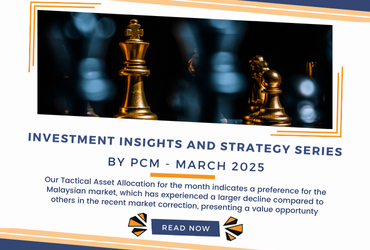
September has historically been a challenging month for investments. Seasonality could be one of the main factors. This year, volatility could be heightened as we anticipate a potential Fed rate cut in September and the upcoming US Presidential Election in November.
When considering the Malaysian market which is represented by the KLCI, historically, September had shown weakness for the KLCI, with an average return of -2.13% over the past 10 years. In fact, In the last decade, only 1 year (2015) had positive returns. If we extend the analysis to a 20-year time frame, KLCI registered a return of -0.79% over the past 20 years and 8 out of the past 20 years were positive (see Exhibit 1 & 2).
On the other side of the globe, the US market which is represented by the S&P 500 Index also demonstrated the same trend. Over the past decade, it had seen positive returns in only 3 out of 10 years, averaging -2.31% return. However, extending the analysis to a 20-year period, the average return in September improved slightly to -0.70%, impacted by occasional positive returns from 2004 to 2007 before the Global Financial Crisis (see Exhibit 3 & 4). Consequently, the MSCI World index, which has a large weightage in the US market, exhibited a negative overall return in September over the past decade (-2.38%), and -0.73% over the past 20 years (see Exhibit 5 & 6).
Separately, in the Asia Pacific ex Japan market, as depicted by the MSCI Asia Pacific ex Japan Index, September had experienced a -3.20% return over the past decade. Positive returns were observed in only 2 out of 10 years (2016, 2019). Separately, the Asia ex Japan market saw -0.32% return over the past 20 years. Positive returns were observed in 10 out of 20 years (see Exhibit 7 & 8). This can be attributed to the Hong Kong market’s weakness, averaging -3.88% over the past 10 years, while positive returns were observed in only 2 out of 10 years (also 2016, 2019). HK market saw an average return of -1.07% in the past 20 years and. Positive returns were observed in only 10 out of 20 years, respectively (see Exhibit 9 & 10).
While historical patterns might suggest potential market vulnerabilities, it is essential to remember that past performance does not guarantee future returns. We believe investors should stay invested for the long term and ignore the short-term volatilities.
Ultimately, the decision to stay invested or sell during market weakness depends on individual circumstances, risk tolerance, and investment objectives. It is essential for investors to conduct thorough research, maintain a diversified portfolio, and consider seeking advice from professional asset managers to make informed decisions.
Opportunities May Arise
In our previous analysis, we explored why the market struggled in early August due to economic data indicating a U.S. slowdown, concerns over AI, high tech valuations, and Japan’s interest rate hike impacting Yen carry trades. However, the market has since recovered from the sell-off. Most of the Unit Trust Funds (Global, Asia, Malaysia) we track (Exhibits 11, 12, 13) also experienced a V-shaped recovery.
September started on a weak note with a sell-off in U.S. tech stocks and recession fears triggered by disappointing U.S. economic data, which also affected Asia. However, we expect global equity markets to remain generally positive, primarily due to (i) anticipated monetary easing from expected U.S. Fed interest rate cuts and (ii) continued robust macroeconomic and earnings growth. We will keep an eye on U.S. election developments, as elevated uncertainty leading up to the November election and unexpected campaign events in late 3Q and 4Q could create market volatility, impacting sector positioning and security selection.
However, in the long term, we believe the U.S. market remains strong, supported by the resilience of corporate earnings. Additionally, the deeply discounted valuations in the Chinese market present potential for a mean reversion trade. Finally, we remain optimistic about Malaysia, driven by potential U.S. rate cuts, the formalization of the Johor-Singapore Special Economic Zone, and sustained policy execution (National Semiconductor Strategy, petrol subsidy rationalisation).
Phillip Capital Malaysia and our offerings
We reaffirm our belief that there are still opportunities in the market, and we maintain a discerning approach in choosing high-quality stocks for our portfolio. However, it is crucial to exercise caution and carefully select investment options to ensure the best risk-adjusted returns. By taking a vigilant and discerning approach, investors can potentially reap the benefits of the current market opportunities while minimising risks.
A noteworthy avenue for investors seeking diversification in their portfolio is through PhillipCapital Malaysia. PhillipCapital Malaysia offers multiple private mandate services managed by professional fund managers. By leveraging PhillipCapital Malaysia’s private mandate services, investors can enhance their resiliency, optimise portfolio performance, and navigate the complexities of the market with confidence.
We also offer both conventional and Shariah-compliant options to cater to the needs of all investors. For Malaysia’s mandates, we like:
- PMART/PMA Dividend Enhanced and/or PMART/PMA Dividend Enhanced ESG
Our PMART Dividend Enhanced and PMA Dividend Enhanced is an income-driven portfolio focused on high dividend-yielding equities. We apply the Dog of the Dow approach, screen and select top market cap stocks to minimise risk and ensure consistent performance. The portfolio is an equal weighting portfolio which reduces concentration risk and provides similar exposure to all clients, both initially and after rebalancing. We offer both conventional and Shariah investment options to cater to the diverse needs of our investors. Click here to learn more. We recently also introduced PMART/PMA Dividend Enhanced ESG Mandate as we remain dedicated to investing in ESG stocks given their stronger valuation and profitability.
- PMART/PMA ESG
Phillip Capital Malaysia offers discretionary portfolio that invests in stocks with high ESG ratings from the F4GBM and F4GBMS Indices, namely PMART and PMA ESG. There are both conventional and Shariah options available. To explore the companies in which both Conventional and Shariah ESG mandates invest, you can refer to the provided link.
- PMART/PMA Blue Chip and Opportunity
Our Blue-Chip portfolios primarily allocate our investments towards companies with large market capitalisations, while the Opportunity portfolios predominantly invest in companies with smaller market capitalisations. We also offer both conventional and Shariah-compliant options to cater to the needs of all investors.
Please click on the link to learn more or email us at cse.my@phillipcapital.com.my if you require any further information.
Disclaimer:
The information contained herein does not constitute an offer, invitation or solicitation to invest in Phillip Capital Management Sdn Bhd (“PCM”). This article has been reviewed and endorsed by the Executive Director (ED) of PCM. This article has not been reviewed by The Securities Commission Malaysia (SC). No part of this document may be circulated or reproduced without prior permission of PCM. This is not a collective investment scheme / unit trust fund. Any investment product or service offered by PCM is not obligations of, deposits in or guaranteed by PCM. Past performance is not necessarily indicative of future returns. Investments are subject to investment risks, including the possible loss of the principal amount invested. Investors should note that the value of the investment may rise as well as decline. If investors are in any doubt about any feature or nature of the investment, they should consult PCM to obtain further information including on the fees and charges involved before investing or seek other professional advice for their specific investment needs or financial situations. Whilst we have taken all reasonable care to ensure that the information contained in this publication is accurate, it does not guarantee the accuracy or completeness of this publication. Any information, opinion and views contained herein are subject to change without notice. We have not given any consideration to and have not made any investigation on your investment objectives, financial situation or your particular needs. Accordingly, no warranty whatsoever is given and no liability whatsoever is accepted for any loss arising whether directly or indirectly as a result of any persons acting on such information and advice.






